#japanese vocab
Text
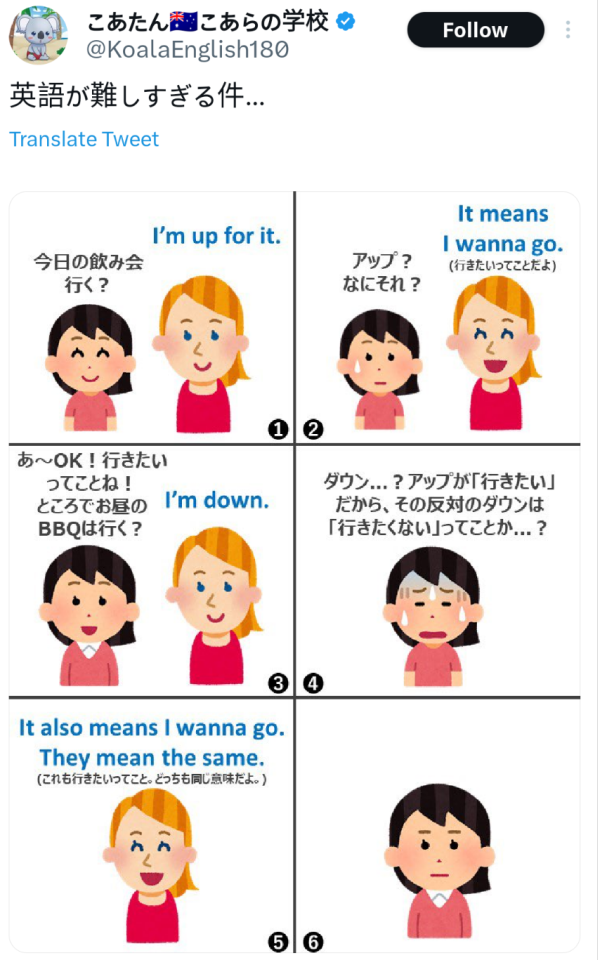
#japanese#learning japanese#japanese vocab#langblog#japan#anime#tumblr language#langblr#manga#japanese vocabulary
20K notes
·
View notes
Text
here’s an interesting internet word i just learned:
垢作る(あかつくる) = to make an account (on a website)
the use of 垢 is as an ateji from アカウントを作る! 💻🖱
466 notes
·
View notes
Text
Japanese vocab: some words I messed up/forgot this week:
Colour indicates pitch accent (pink = high then falling, orange = remains high, purple = flat)
All sample sentences are from Renshuu app.
景色(けしき)- scenery, scene, landscape [noun]
その国は山の景色が美しいので有名です。The country is renowned for its beautiful mountain scenery.
贈り物(おくりもの)- gift, present [noun]
エミは素敵な贈り物に驚きました。Emi was surprised at the nice gift.
郊外(こうがい)- suburb, commuter belt [noun]
郊外から通う学生はバスで通学している。Students that commute from the suburbs come to school by bus.
最も(もっとも)- most, extremely [adv]
日曜日は私が最も暇な日だ。Sunday is the day I'm most free.
とうとう - finally, at last, in the end, ultimately [adv]
とうとう私の姉は婚約した。Finally, my sister got engaged
適当(てきとう)- suitable, proper, appropriate [な-adj]
適当な時に彼にそれを言いましょう。I will tell him at the proper time.
無くなる(なくなる)- to be lost, to be used up [v1, intr]
彼女は元気が無くなった。She's not as energetic as she once was.
鳴る(なる)- to sound [v1, intr]
突然ベルが鳴った。Suddenly, the bell rang.
構う(かまう)- to mind, to care about [v1, /intr]
ここに座っても構いませんか?Do you mind if I sit here?
しばらく - for a moment, for a minute
しばらく考えさせてください。Let me think for a moment.
講義(こうぎ)- lecture [noun/v3]
講義の間、彼女はとても退屈だった。She was very bored during the lecture.
招待する(しょうたいする)- to invite [v3]
彼をパーティーに招待してもいい?Can we invite him to the party?
倒れる(たおれる)- to fall (over, down) [v2, intr]
その男は倒れた木に座っていた。The man was sitting on a fallen tree.
#nutcracker nihongo#japanese langblr#learning japanese#japanese vocab#pitch accent will be the fucking death of me i stg ughhhhhh
128 notes
·
View notes
Text
What’s In A Title?: Variations on “Master” in Black Butler
旦那様・当主・ご主人様・マイロード・様・坊ちゃん
Throughout the manga, we see various titles used for Vincent, Real Ciel, and Our Ciel, with these being more obvious in the original Japanese than in translation.
This post will focus on Sebastian and Tanaka and the various terms they use at different points within the story.
I personally am not an expert on keigo (the most formalized of speech that Sebastian speaks almost exclusively in in Japanese), so I am not really going to be going into the subtleties there. (Other posts have tackled this already, and probably with more expertise than I could.)
I also want to emphasize I am only now beginning to read the manga from ch 1 in Japanese (I’ve only read bits and pieces until the most recent ~25 chapters or so), so it is possible I am missing some examples or variations mentioned in other parts of the 200+ chapters not brought up here.
However, I think we can still look at these subtle differences even if you are an English speaker who knows zero about formality levels/humble speech in Japanese. And if you’re willing to take this journey with me despite these caveats, keep reading.
旦那様・当主・ご主人様・マイロード・様・坊ちゃん
Before I get into the variations between Sebastian and Tanaka, let’s look at some of the titles used:
The variations are as follows:
Dannasama - 旦那様
Toushu - 当主
Shujin - 主人
Goshujinsama - ご主人様
“my lord” - ご主人様・マイロード
Lord Ciel - シエル様
Bocchan - 坊ちゃん
Tanaka
Tanaka uses #1, #2, #3, #6, and #7. Let’s look at him first.
Dannasama - 旦那様
Means “master of the house,” but is also a term you’d use with a boss or someone of higher status, akin to “sir” in some usages in English.
Tanaka uses this term only for Vincent, so far as I know.
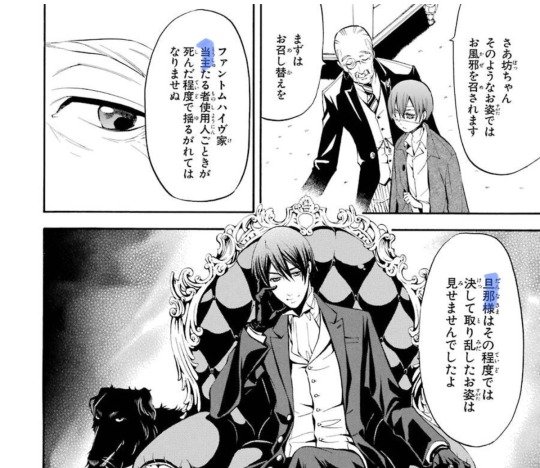
Toushu - 当主
Means “present head of the family.”
Tanaka uses this when speaking about/to Our Ciel when distinguishing him from his father, the previous head. For example, in the murder arc when he points out that it isn’t appropriate for the master of the house to be upset by a servant’s death.
Shujin - 主人
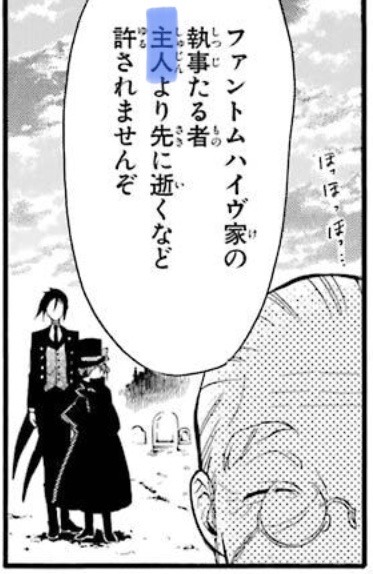
Means “head of the household” or “master” (among other uses). This version does not have the added formality/humbleness of the versions that Sebastian uses (the go- prefix and the -sama suffix).
Tanaka uses this when speaking generally about “the master” or “one’s master,” for example, in the end of the murder arc when he tells Sebastian a Phantomhive butler shouldn’t die before his master.
Lord Ciel - シエル様

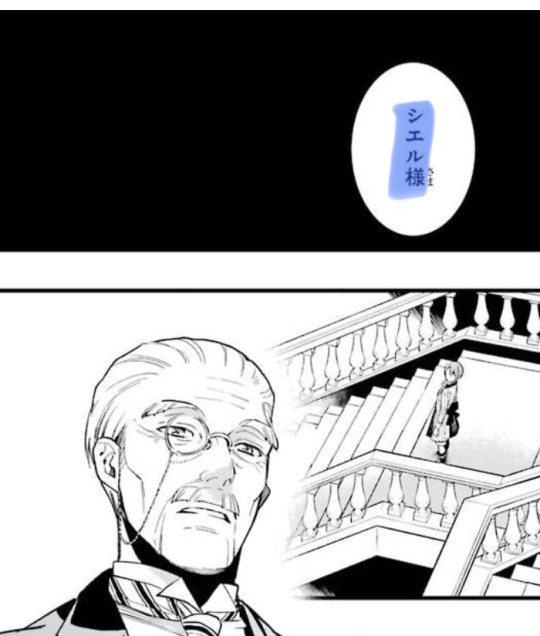
Just Ciel + the kanji for “sama,” is how Tanaka refers exclusively to Real Ciel throughout the manga, to the best of my knowledge, when speaking to or of him specifically, individually.
Above, we see how in the example on the right (in the present), Tanaka calls RC “Lord Ciel” directly, and in the example on the left, how he refers to him that way in the past as well when not directly addressing him. (OC is “you” or 貴方 there.)
Bocchan - 坊ちゃん
Means “young master,” and is how Tanaka refers to Our Ciel almost exclusively (except for the examples above), not only before the tragedy but after. He immediately knew that Ciel was OC and not his twin, and we know this because of the address.

Sebastian seems to have picked up the title from Tanaka, because he does not use it before they see him. Above, he even puts special emphasis on the title when he uses it for the first time. And as far as I know, aside from “my lord,” he refers to Ciel as such exclusively thereafter.
旦那様・当主・ご主人様・マイロード・様・坊ちゃん
Sebastian
Sebastian uses #4, #5, and #7.
Goshujinsama - ご主人様
Means “head of the household” or “master” (among other uses). This version does include the formal/humble prefix “go-” and suffix “-sama.”
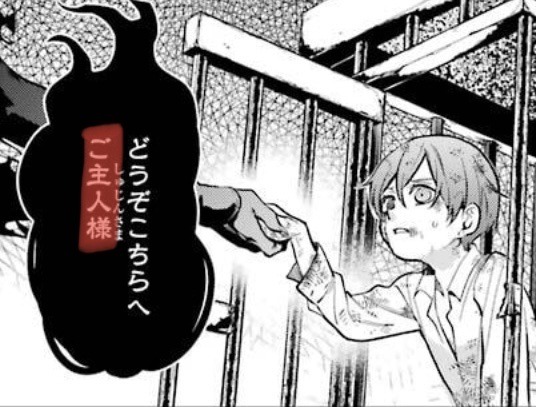
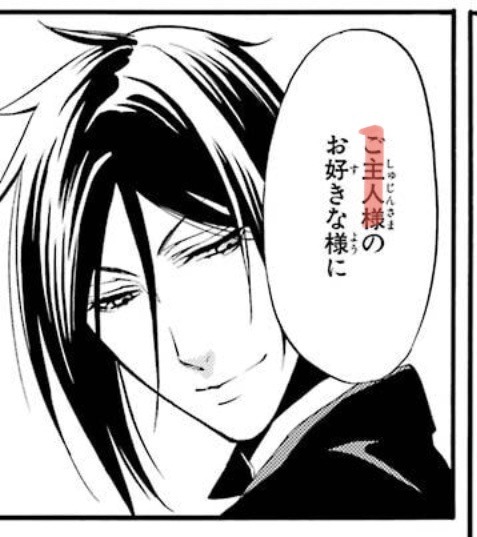
This is the first term that Sebastian uses for Ciel when he shifts from “you” (貴方, anata) to “master,” when they first begin establishing the contract. He also uses a variation on this I’ll explain next, but THIS version, said exactly like this, he stops using after their visit to Tanaka.
You can see in the above examples that he uses this address both before and after he assumes his butler form.
I expect that this is likely how Sebastian has referred to all his masters as I believe it’s the most humble/formal way of addressing one’s master (aside from more specific titles that may be used).
My Lord - ご主人様 ・マイロード

Even before he adopts “bocchan,” Sebastian sometimes refers to Ciel in English as “my lord,” as Yana informs us via the katakana spelling on the kanji. Yet she still writes it in keigo, as if to reminds us of the manner in which Sebastian speaks, and that even if he has dropped the uber formal “goshujinsama,” he is, in a sense, still using it throughout the story.
Bocchan - 坊ちゃん
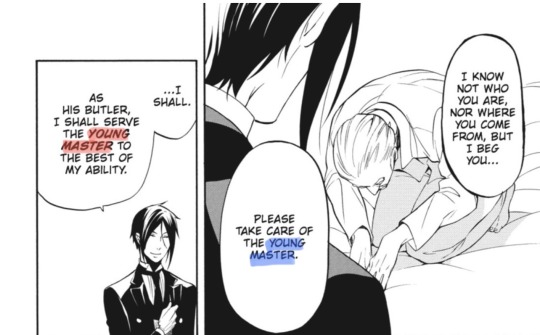
As I explained above, this seems to be a manner of address Sebastian picks up from Tanaka. It seems to imply that he does so partly because he recognizes that the old man is aware of Ciel’s real identity (unlike Madam Red, who assumes he’s RC, which is why Ciel looks so dead-eyed while Sebastian is smirking).
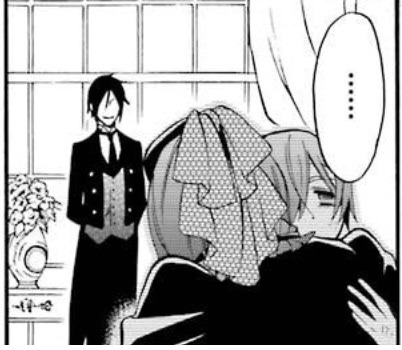
Maybe he does it to mock him at first, a reminder that Sebastian knows he’s a liar. Maybe he adopts it because he’s never had a young master before and decides it could be a fun change of pace.
Unless Yana says something or reveals more insight into Sebastian’s POV, however, we may never know exactly why he made this shift and stuck with it.
旦那様・当主・ご主人様・マイロード・様・坊ちゃん
And that’s my rundown of how “master” is used in Japanese by Sebastian and Tanaka, depending on who they’re addressing or referring to and at what point we are in the story. As you can see, most of it is lost in translation.
If you enjoyed this post, you may like to check out some of my other kuro translation posts, including my pronoun series, in which I explain why various characters use certain personal pronouns.
Reblogs and tips are also always appreciated!
#black butler#黒執事#sebastian michaelis#tanaka#ciel phantomhive#real ciel#our ciel#vincent phantomhive#poi translation#japanese language#keigo#master#young master#坊ちゃん#主人#当主#ご主人様#マイロード#旦那様#japanese vocab#poi og#100 notes
159 notes
·
View notes
Text
[Japanese→English] @panmaumau Tweet — Color Coded Translation

————————————————————————
何も知らない生き物の顔
なにもしらないいきもののかお
The face of a living thing that doesn’t know anything.
————————————————————————
Please correct me if I made a mistake
#color coded translation#japanese#japanese vocabulary#study japanese#japanese lesson#easy japanese#beginner Japanese#learning japanese#japanese lingblr#japanese linguistics#learn japanese#japanese langblr#japanese learning#japanese language#japanese vocab
78 notes
·
View notes
Text
ミーハー
= people who are easily influenced by trends etc.
Ex. 彼女はいつも、ミーハーなブランドばかり身に付けている。
かのじょは いつも、ミーハーなブランドばかり みに つけている。
She always wears only trendy brands.
Notes: The full word is みいちゃんはあちゃん but it is often shortened to ミーハー. Apparently it's because many girls had (or still have) names starting with み or は such as みか、みきこ、みつこ、みやこ、みどり or はつこ、はまこ、はつ、はす、はま、はる and the nickname is みーちゃん or はーちゃん.
The word has existed for a long time hence why there are more theories regarding the origin of it out there as well. See here (site is in Japanese)

134 notes
·
View notes
Text
• 披露宴 「ひろうえん」 - reception (e.g. wedding), banquet, celebration, party
• 露呈 「ろてい」 - exposure, disclosure
• 露見, 露顕 「ろけん」 - discovery (of a plot, misdeed, etc.), detection, exposure, disclosure
• 露骨 「ろこつ」 - 1. open, unconcealed, undisguised, blatant, plain, frank 2. broad, lewd, indecent, crude
• 暴露 「ばくろ」 - disclosure, exposure, revelation
• 露 「つゆ」 - 1. dew2. tears
• 披露 「ひろう」 - announcement, presentation, demonstration, displaying, showing, introducing, exhibiting, unveiling, revealing, showcasing, performing, giving a rendition
• 露店 「ろてん」 - street stall, stand, booth
• 露出 「ろしゅつ」 - exposure, laying bare, baring (e.g. skin)
#japanese#langblr#japanese vocabulary#language blog#kanji#japanese kanji study by chase colburn#step-by-step kanji#japanese language#japanese vocab#jlpt n1
59 notes
·
View notes
Text
Assortment of random Japanese words I‘ve learned since arriving here without studying
足元(あしもと)- at one’s feet, underfoot (heard over a tannoy announcement at the station warning passengers to take care when boarding the train)
参る(まいる)- to come, to go (humble) (they never say “電車がきます” when the train’s arriving; it’s always “電車が参ります”)
まもなく - soon (humble) (again, they never say “もうすぐ” on the train; it’s always まもなく. To the point where I actually forget もうすぐ and end up saying まもなく to my teacher and she laughs at me)
最高の(さいこうの)- the best (from My Hero Academia, because they say “the best hero” literally all the time, and at first I was like “you want to be a psycho hero? What??”)
残念(ざんねん)- unfortunate, too bad (randomly heard on the radio and recalled I’d looked it up recently, and then heard it again a couple of times in anime)
さすが - as expected of (hear it in My Hero Academia aaaaall the time)
揚げ鶏(あげどり)- Japanese-style fried chicken (I asked the cashier how to pronounce it when I ordered it)
本線(ほんせん)- mainline (I hear this literally every time I use the local trains because it’s the name of the line, but I only just figured out what it means)
鼻水(はなみず)- snot (lit. nose water) (hear this all the time when kids want a tissue. They just come up to me and say “先生。鼻水” and I’m like ok gross just go get a tissue you don’t have to ask me)
おっぱい - boobs (heard in class as I got groped by a five-year-old girl, double-checked the meaning on the way home)
甲虫(かぶとむし)- rhinoceros beetle (they’re on one of the videos we put on for the kids when they’re coming into the class and they all just say “kabutomushi” whenever it comes up on screen)
かぶと - a particular style of traditional Japanese helmet worn by ancient warriors (it’s in one of the pictures I had to use this term where I ask the kids “what can you see?” and every single class someone would point to it saying “kabuto”)

I was actually really confused the first time they said it because Kabuto is the name of a Pokemon (and not one I’d really expect them to know because it’s from the original 150 and hasn’t really featured in more recent generations) but it looks like this:

So I was like. Wtf there’s no Kabuto here, wtf are you on about?
#japanese#japanese vocab#japanese langblr#learning japanese#there are a lot of other words i learn from those videos where the kids just say the japanese#some of them have already started saying the english instead now#but a lot still say the japaense first#or i'll show them a flashcard and they'll say the japanese bc they don't know the english#or i'll ask them to get me a flashcard as part of a game and they'll shout the japanese to each other#i still suck at grammar but i know my animals and colours and stationery pretty well now!
133 notes
·
View notes
Text
兎 / 卯 (u-sa-gi) "rabbit"
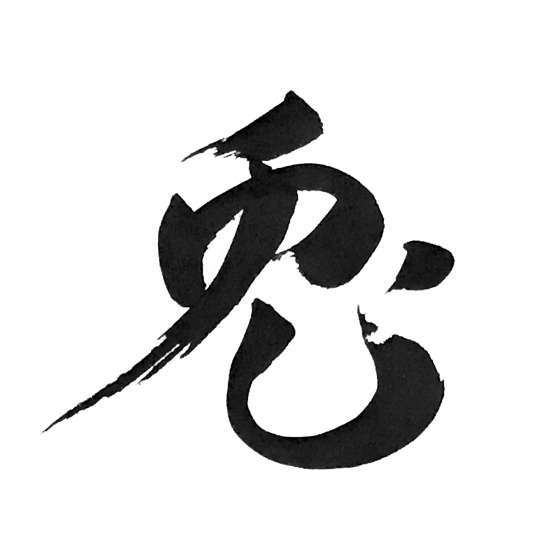
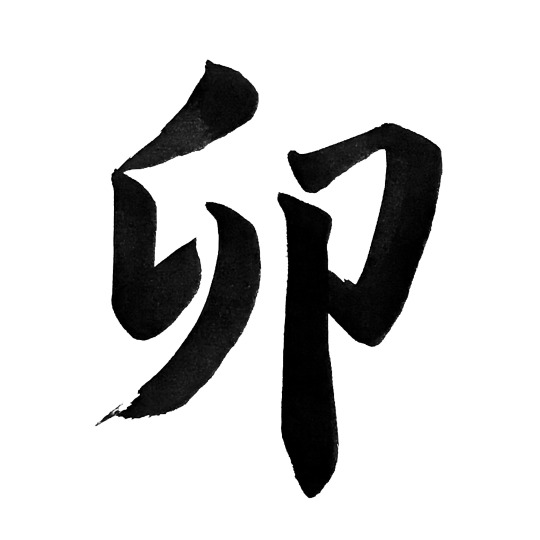
Like many East Asian countries, each year in Japan is represented by one of 12 animals.
These animals are part of a divination system called “eto”. In English it’s often called “Chinese Zodiac”.
2023 is the year of the rabbit.
In Japanese, the Chinese Zodiac kanji of each animal is different from the regular kanji of that animal.
The top kanji in this post is the regular kanji for talking about rabbits in general, so this is the kanji you see used in books.
The bottom kanji is used to talk about the rabbit in the Chinese Zodiac, so this is the kanji you see on "nen-ga-jo" (Japanese New Year's cards).
According to the Chinese Zodiac, rabbits are peaceful and gentle, meaning rabbit years offer opportunity for rest and relaxation.
After 2022, which was the dynamic and aggressive year of the tiger, some downtime would be ideal.
Rabbits are also quick and agile, so rabbit years are characterised by business opportunities opening up, and more travelling.
Whether you spend your time relaxing or travelling, I wish all of you a very happy year of the Rabbit!
#rabbit#2023#new year#happy new year 2023#japanese language#japanese#japanese cullture#japanese art#japanese calligraphy#calligraphy#japanese langblr#japanese vocab#chinese horoscope#eto#japan#書道#kanji
186 notes
·
View notes
Text
Beginner Phrases (Japanese)
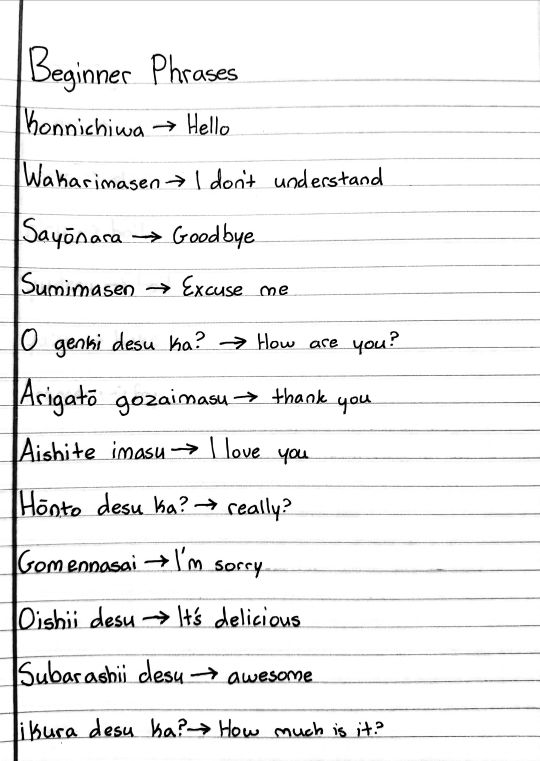
#langblr#studyblr#notes#my notes#language#language notes#japanese#japanese notes#japanese language#japanese language notes#vocab#vocab lists#japanese vocab
31 notes
·
View notes
Text

#japanese#learning japanese#japanese vocab#langblog#japan#langblr#manga#japanese vocabulary#anime#tumblr language
238 notes
·
View notes
Text
3語の間違えやすい動詞

飽きる(あきる) = to get tired of, bored of
呆れる(あきれる) = to be amazed; to be shocked
諦める(あきらめる) = to give up
111 notes
·
View notes
Text
Let's Learn Natively (TL :Japanese) | Reading
Why it's important to read as much native materials as you possibly can in your target language and where/how to start.
※ When learners first embark on their journey of picking up a new language, the first thing we do is familiarize ourselves with the alphabet, pronunciation, and other important innerworkings on the language. With Japanese, the first step is to learn hiragana and katakana. A lot of people stop in the middle of that because they feel that it's not worth learning the language if they have to learn that many letters. But what if you've made it past that point? Where do you go from there? Of course, we move on to basic grammar and sentence structure so that you can begin to understand why sentences are formed the way that they are. (and, of course, vocab words).
※ However, while textbooks and workbooks do teach us the way that sentences are formed, it's stiff. Of course, the purpose behind that is to make sure that you understand the basics before you move on to more native/nuanced versions of the structures. But once you're ready to do that, where do you go? Click below to keep reading:
★If you're ready/interested in reading native material, and you don't know where to start, I highly recommend trying out Natively. Think of this as a goodreads for Japanese learners.
★If you're concerned about picking a book or series that's too difficult or too long for you, the website has already taken that into account. The website is structured so that all of the books and series that are on there are added, graded, and reviewed by fellow Japanese learners. The grading system that is utilized goes from Level 0 to Level 41; the grades roughly correspond with JLPT levels (if you're preparing for the JLPT and are trying to prepare for the reading comprehension section). You can learn more about the grading system by clicking here.
★The website includes all sorts of books: textbooks, graded readers, light novels, manga, novels, children's books, short stories, and other kinds of books. When you click on a title or see it in the search results, the color coded grade will pop up next to it. These grades are user-determined. When users finish reading a book, we're prompted to grade the difficulty level in comparison to other books that we may have already read. In doing so, the difficulty level of the book might change when calculated in with other reviews. The point of this is to help fellow learners gauge what types of reads you find find difficult and which ones you find to be easy. Here's an example photo:
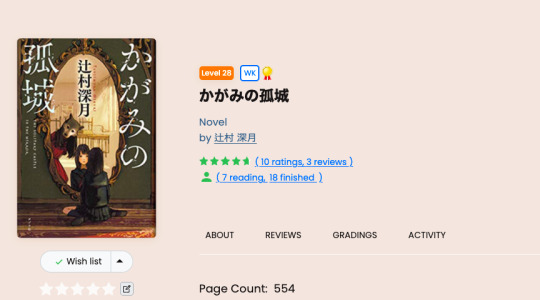
☞Caveat: don't feel discouraged if you found a book to be difficult even though it didn't seem like it would be. Everyone thrives in different areas and different subjects. Just because something was graded at N5 and you had difficulties with it at N3 doesn't mean anything--it might mean that it wasn't something to your liking. There are some series that I have difficulty with because of pacing or because I lacked interest in it.
❀ If you're worried about reading a book or series on your own and you're looking for friends to read and discuss about it with, come join us over on the discord and propose it as an option in the bookclub.
㉄ Can't find a particular book or series that you're looking for on the website? You can request for it to be added here.
★ The website is also equipped to let you "organize" your library into categories and track your reading progress. Additionally, you can make your library and reading progress private if you don't want anyone to see. As I'm currently using this blog to be as open as I can possibly be on my language learning journey, mine is made public. Feel free to check me out on the website.
★This is not sponsored, but if you receive a welcome message from Brandon, the owner and creator of the website, tell him that maobuchou sent you (that's me! ☺️). Brandon is really nice, so if there's anything that you're confused about or if you have suggestions for the website, he has an option for you to contact him.
★If you're interested in seeing what I'm currently reading, what I'm interested in reading next, and what I've graded thus far, click here to follow me (I'll follow back). Following other users allows you take a peek at what books they're reading. I also update my profile to say what book is also being read in the discord bookclub.
There will be more posts to come in the future about ways to become comfortable with reading in your target language.
#onigiristudies#japanese#learn japanese#nihongo#jlpt#resources#natively#jlpt n3#jlpt n2#jlpt n4#jlpt n1#jlpt n5#japanese grammar#japanese vocab#japanese langblr#learning japanese#langblog#japanese vocabulary#japanese studyblr
460 notes
·
View notes
Text
JLPT N5 - くなる and くする
This grammar point is very simple. You use くなる when the condition of something becomes a certain way by itself. On the other hand, くする is used when the condition of something is changed by an outside agent (either a person or a thing). In this post, let’s look at these two very basic constructions and how the Japanese works.
Here is your vocabulary:

【The Grammar】
The grammar is very simple. First, you take an adjective or a noun and change them to their adverbial forms. For example, the adjective 長い has an adverbial form of 長く. The noun ひま has an adverbial form of ひまに.
After you make the adverbial forms of the adjective or the noun, you just put it before either なる or する. That’s it!
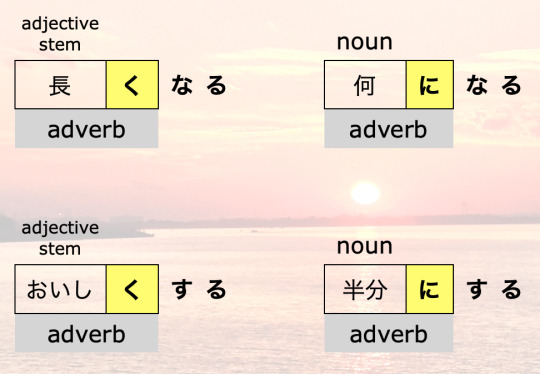
We talked about the く connector in this post and about the adverbial に in this post.
I should point out that while this grammar point appears in most JLPT books and websites as くなる and くする, as you can see in the picture above, nouns don’t use く! For that reason, I choose to call this point adverb ✙ なる and adverb ✙ する.
【adverb + なる】
Here are some examples with なる:
① 熱が下がって、気分がだいぶ{よくなりました}。
=fever will go down and then feeling became considerably better
= My fever went down and then I felt much better.
② この仕事が終わったら、少し{ひまになる}と思います。
= when work finishes, a little bit, will become free, I think
= I think that when work finishes, I’ll have more time.
③ このごろ仕事が減って、前ほど{忙しくなくなった}。
= these days, work decreased and so as much as before, became not busy
= These days, I have less work and so I’m not as busy as before.
④ きみは{大人になったら}、{何になりたい}の。
= when you become an adult, what want to become
= When you grow up, what do you want to be (and explain)?
Some things to notice:
In example 1, the sense is that when the fever went down, the person’s mood got better by itself.
In example 2, the condition of having more free time arises naturally when work decreases. (ひま can have the connotation of having absolutely nothing to do and can be considered rude by some people. I use the word for myself sometimes, but I never seriously refer to other people as ひま.)
Concerning example 3, the negative form of 忙しい is with 忙しくない. If you want to make THAT into an adverb, it will become 忙しくなく. This was very difficult for me when I was just beginning Japanese.
Finally, Example 4 shows that the question word of 何 can be treated as a noun. This makes sense if you think of it as a placeholder for whatever answer the listener will give. Also, because the speaker uses the word きみ we know that the speaker and listener are close. It would make sense if it were a parent-child relationship. きみ is NOT used with people that you have just met or that you don’t know well!
【adverb + する】
Here are some examples with する:
⑤(父が子どもに)もっと部屋を{きれいにしなさい}。
= father to his child: a little bit more the room, make it clean
= Clean up your room a bit more.
⑥ このケーキ、ちょっと大きいから、{半分にして}ください。
= this cake, a bit big and so make it half please
= This cake is a bit (too) big so please cut it in half.
⑦ スカートを5センチぐらい{短かくして}ください。
= this skirt, about 5 centimeters make it short please
= Please shorten this skirt about 5 centimeters.
Notice that examples 5, 6 and 7 all include someone (other than the speaker) making a thing (a room, a cake, and a skirt) a different condition than the current one. This is when you will want to use adverb + する.
【Conclusion】
The grammar points of adverb ✙ なる and adverb ✙ する are pretty simple to understand. That is why they are considered Level N5. Adverb ✙ なる shows a person or a thing becoming a different condition by itself. Adverb ✙ する shows a person or a thing changing to a different condition by a different person or thing.
Thanks for reading, and see you next time!
Rice & Peace,
– AL (アル)
👋🏾
#japanese#japanese grammar#learn japanese#japanese language#japanese lesson#japanese study#japanese vocabulary#japanese vocab#japanese verbs#studying Japanese#japaneselessons#learnjapanese#japanese studyblr#japanese langblr#JLPT#JLPT N5#jlptn5#にほんご#日本語#日本語の勉強#一緒日本語#language#languages#language study#language studyblr#language blr#IsshoNihongo
388 notes
·
View notes
Text
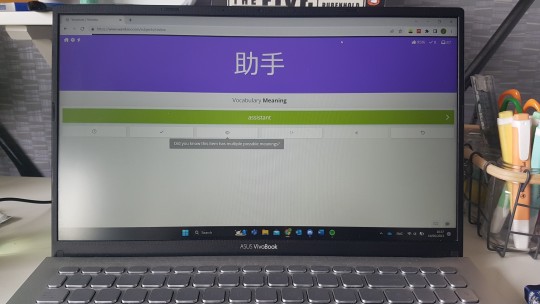
morning wanikani lessons - 19/06/2023:
研究室 - けんきゅうした - laboratory
当て字 - あてじ - phonetic kanji
目医者 - めいしゃ - eye doctor; oculist
一番目 - いちばんめ - the first
楽しみ - たのしみ - looking forward to; enjoyment
~向け - むけ - made for; intended for
研究所 - けんきゅうしょ - research institute
近道 - ちかみち - shortcut
助かる - たすかる - to be helped
楽しむ - たのしむ - to enjoy; to have fun
#japanese#japanese langblr#japanese vocab#japanese vocabulary#langblr#language learning#learning languages#polyglot#multilingual#studyblr#studying#study blog#my posts
35 notes
·
View notes
Text
寝ぼける
ねぼける
= to be still half asleep
Ex. 彼は寝ぼけて階段から落ちて骨折したそうだ
かれは ねぼけて かいだんから おちて こっせつしたそうだ。
While still being half asleep, he fell down the stairs and broke his arm.

167 notes
·
View notes